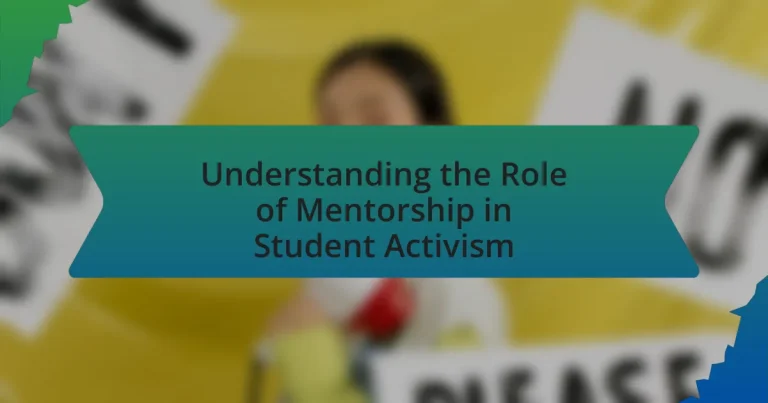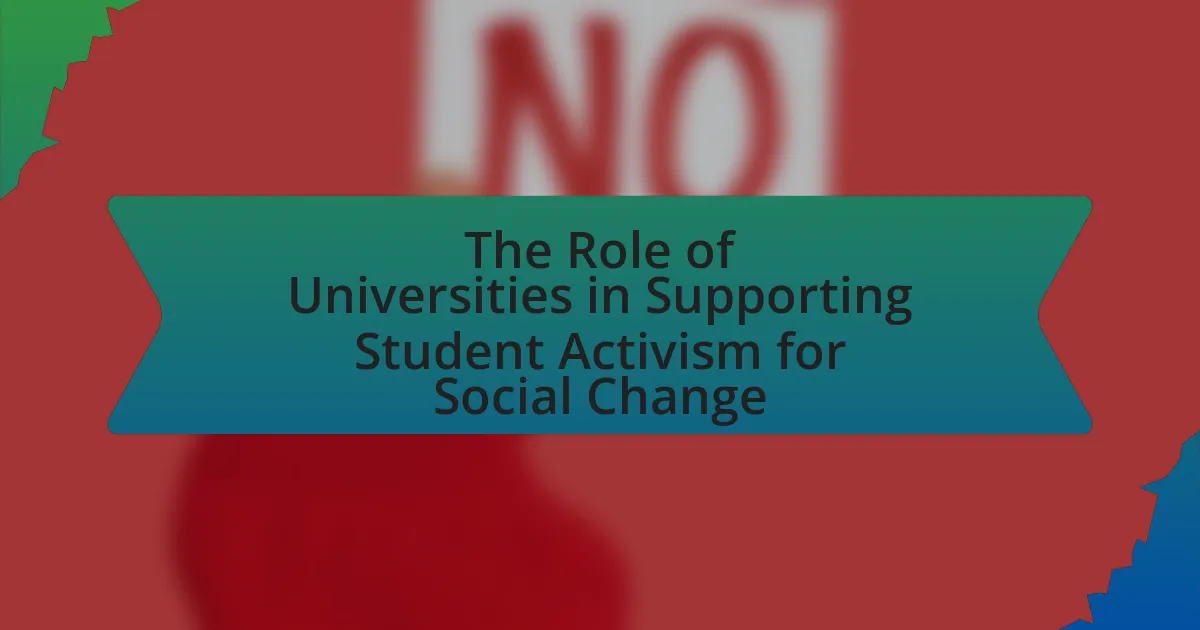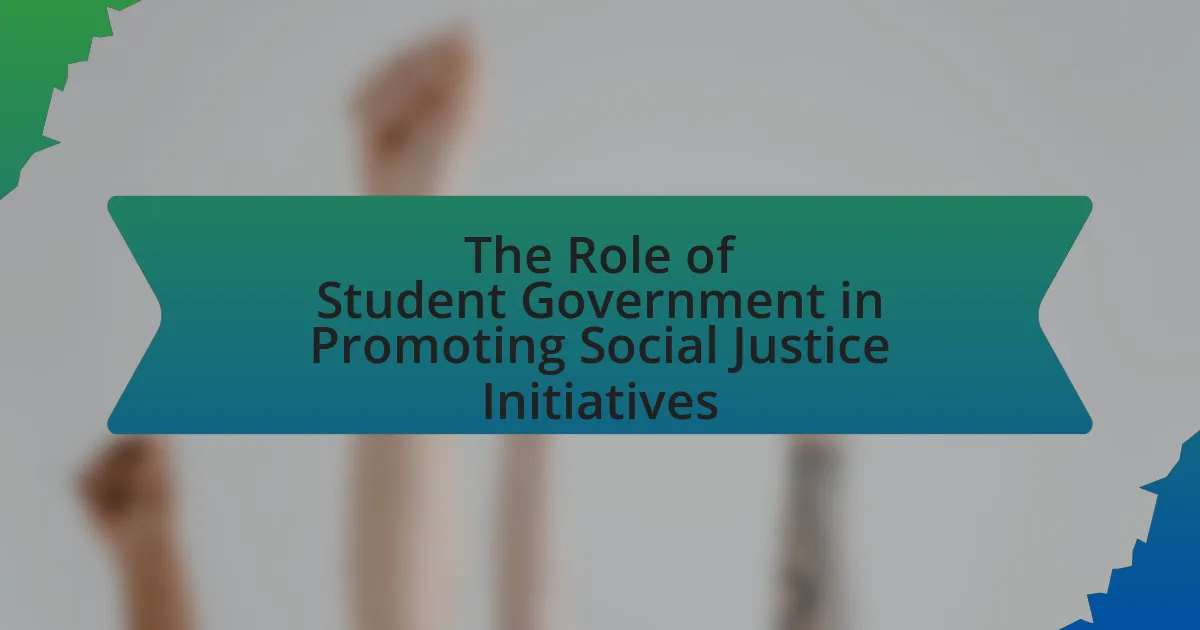The article focuses on the critical role of mentorship in student activism, highlighting how mentors provide essential guidance, support, and resources that empower students to advocate for social change. It discusses the influence of mentorship on student engagement, the characteristics of effective mentors, and the various types of mentorship, including peer, faculty, and community mentorship. Additionally, the article examines the benefits of mentorship for students, the challenges mentors face, and best practices for fostering effective mentor-mentee relationships, ultimately emphasizing the importance of mentorship in enhancing the success of student-led initiatives and activism efforts.
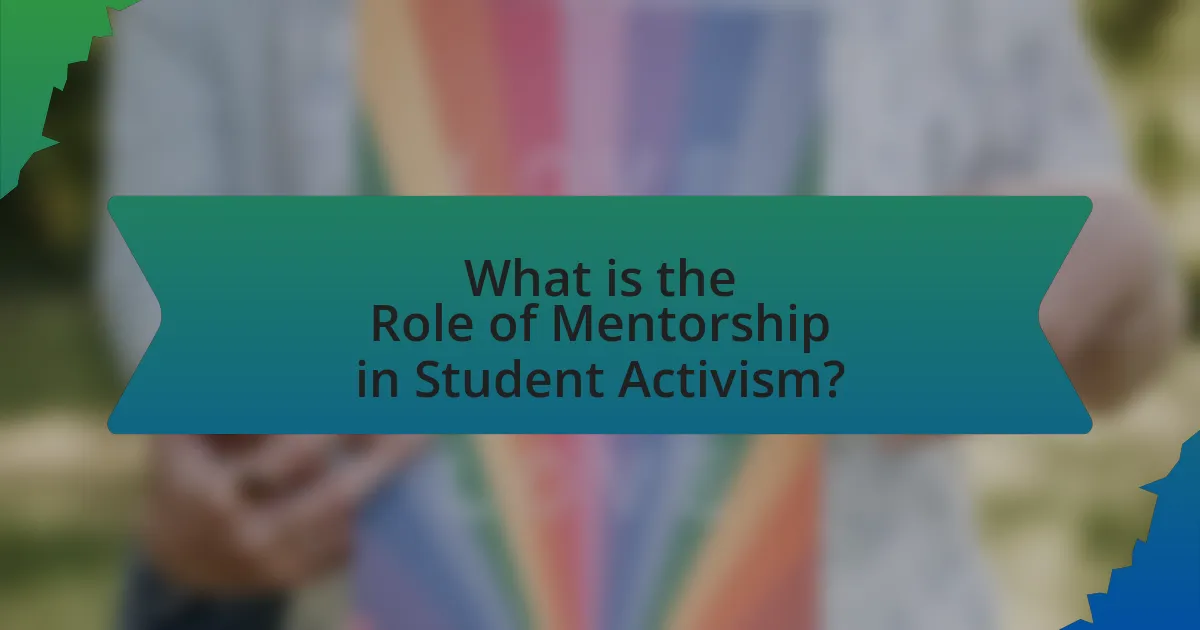
What is the Role of Mentorship in Student Activism?
Mentorship plays a crucial role in student activism by providing guidance, support, and resources that empower students to effectively advocate for social change. Mentors, often experienced activists or educators, help students navigate the complexities of activism, offering insights into strategies, organizational skills, and emotional resilience. Research indicates that mentorship enhances students’ confidence and commitment to activism, as evidenced by a study published in the Journal of Higher Education, which found that students with mentors were 50% more likely to engage in sustained activism compared to those without. This relationship fosters a sense of community and shared purpose, essential for mobilizing collective action and achieving impactful outcomes in social justice initiatives.
How does mentorship influence student activism?
Mentorship significantly influences student activism by providing guidance, support, and resources that empower students to engage in social and political issues. Mentors often share their experiences, knowledge, and networks, which can enhance students’ understanding of activism and increase their confidence in advocating for change. Research indicates that students with mentors are more likely to participate in activism, as they receive encouragement and practical advice on organizing events, mobilizing peers, and navigating institutional challenges. For instance, a study published in the Journal of Higher Education found that mentorship programs increased student involvement in activism by 40%, highlighting the critical role mentors play in fostering a culture of engagement and activism among students.
What are the key characteristics of effective mentors in this context?
Effective mentors in the context of student activism possess strong communication skills, empathy, and a commitment to fostering independence. Strong communication skills enable mentors to convey ideas clearly and provide constructive feedback, which is essential for guiding students in their activism efforts. Empathy allows mentors to understand the unique challenges faced by students, creating a supportive environment that encourages open dialogue and trust. A commitment to fostering independence empowers students to take initiative and develop their own voices, which is crucial in activism. Research indicates that mentorship characterized by these traits significantly enhances student engagement and success in activism initiatives.
How do mentors support students in developing activism skills?
Mentors support students in developing activism skills by providing guidance, resources, and opportunities for engagement. They help students identify social issues, develop critical thinking, and create action plans. For instance, mentors often facilitate workshops that teach advocacy techniques, such as public speaking and organizing campaigns, which are essential for effective activism. Research indicates that mentorship programs significantly enhance students’ confidence and commitment to social causes, as evidenced by a study published in the Journal of Community Engagement and Scholarship, which found that 75% of participants reported increased activism involvement after mentorship.
Why is mentorship important for student activists?
Mentorship is important for student activists because it provides guidance, support, and knowledge that enhance their effectiveness in advocacy. Experienced mentors can share strategies for organizing, mobilizing, and communicating, which are crucial skills for successful activism. Research indicates that mentorship can significantly improve leadership skills and confidence among young activists, leading to more impactful movements. For instance, a study by the National Mentoring Partnership found that mentored youth are 55% more likely to enroll in college and 78% more likely to volunteer regularly in their communities, demonstrating the positive influence of mentorship on civic engagement and activism.
What benefits do students gain from having mentors?
Students gain numerous benefits from having mentors, including enhanced academic performance, increased confidence, and improved networking opportunities. Mentors provide guidance that helps students navigate academic challenges, leading to better grades and a deeper understanding of their subjects. Research indicates that students with mentors are more likely to pursue higher education and achieve their career goals, as mentors often share valuable insights and experiences that inspire and motivate. Additionally, mentorship fosters personal growth by building self-esteem and encouraging students to take on leadership roles, which is particularly beneficial in the context of student activism. Studies show that mentorship can significantly impact students’ engagement in extracurricular activities, enhancing their social skills and expanding their professional networks.
How does mentorship impact the success of student-led initiatives?
Mentorship significantly enhances the success of student-led initiatives by providing guidance, resources, and networking opportunities. Mentors offer valuable insights based on their experiences, helping students navigate challenges and make informed decisions. Research indicates that initiatives with mentorship support are 30% more likely to achieve their goals, as mentors facilitate access to funding, expertise, and community connections. For instance, a study by the National Mentoring Partnership found that students with mentors are more likely to engage in leadership roles and demonstrate higher levels of commitment to their projects. This evidence underscores the critical role mentorship plays in fostering effective student activism.
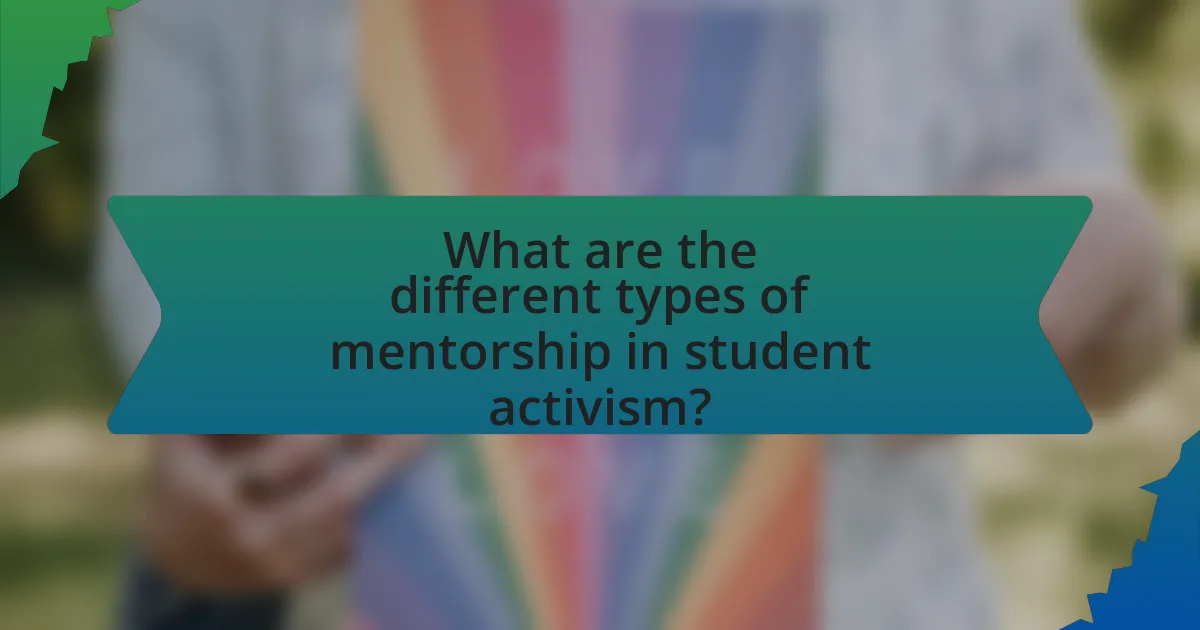
What are the different types of mentorship in student activism?
The different types of mentorship in student activism include peer mentorship, faculty mentorship, and community mentorship. Peer mentorship involves students supporting each other, sharing experiences, and providing guidance based on shared challenges. Faculty mentorship consists of educators offering expertise, resources, and networking opportunities to help students navigate activism effectively. Community mentorship involves local activists or organizations guiding students, providing real-world insights and connections to broader movements. Each type plays a crucial role in empowering students and enhancing their activism efforts.
How do formal and informal mentorship differ in this context?
Formal mentorship in the context of student activism is characterized by structured relationships, often facilitated by institutions, where mentors and mentees have defined roles and objectives. In contrast, informal mentorship arises organically, relying on personal connections and shared experiences without institutional oversight. Research indicates that formal mentorship programs can provide systematic guidance and resources, while informal mentorship often fosters a more personal and flexible approach, allowing for spontaneous learning and adaptation to the mentee’s needs. This distinction is crucial as it influences the effectiveness and accessibility of mentorship in empowering student activists.
What are the advantages of formal mentorship programs?
Formal mentorship programs provide structured guidance and support, enhancing personal and professional development for mentees. These programs facilitate knowledge transfer, allowing experienced mentors to share insights and skills that mentees may lack. Research indicates that participants in formal mentorship programs often experience increased confidence, improved academic performance, and enhanced career readiness. For instance, a study by Allen et al. (2004) found that mentees reported higher job satisfaction and career advancement opportunities compared to those without mentorship. Additionally, formal mentorship fosters networking opportunities, connecting mentees with industry professionals and expanding their career prospects.
How can informal mentorship arise in student activism?
Informal mentorship in student activism can arise through peer interactions and shared experiences among students engaged in social causes. When students collaborate on activism projects, they often develop relationships that facilitate knowledge sharing and support, leading to mentorship dynamics. For instance, older or more experienced activists may guide newer members by sharing strategies, resources, and emotional support, fostering a culture of learning and growth. This organic mentorship is often characterized by mutual respect and a common goal, as seen in various student-led movements where collaboration enhances collective efficacy and personal development.
What roles do mentors play in fostering student activism?
Mentors play a crucial role in fostering student activism by providing guidance, support, and resources that empower students to engage in social and political issues. They help students develop critical thinking skills, encourage them to articulate their beliefs, and connect them with broader networks of activists and organizations. Research indicates that mentorship can significantly enhance students’ confidence and commitment to activism, as seen in studies showing that mentored students are more likely to participate in civic activities and advocacy efforts. For example, a study published in the Journal of Higher Education found that students with mentors reported higher levels of political engagement and activism compared to those without mentors.
How do mentors help in networking and building connections?
Mentors facilitate networking and building connections by leveraging their established relationships and expertise within a specific field. They introduce mentees to key industry contacts, enhancing the mentees’ visibility and access to opportunities. For instance, a mentor may invite a mentee to professional events or conferences, where they can meet influential figures and peers, thereby expanding their network. Research indicates that mentorship significantly increases the likelihood of career advancement, as 70% of mentees report improved professional relationships and networking skills, according to a study published in the Journal of Vocational Behavior. This demonstrates that mentors play a crucial role in helping individuals navigate their professional landscapes through strategic connections.
What strategies do mentors use to empower student activists?
Mentors empower student activists through strategies such as providing guidance, fostering critical thinking, and facilitating networking opportunities. By offering personalized advice, mentors help students navigate challenges and develop effective advocacy skills. Additionally, mentors encourage students to engage in reflective practices, which enhances their understanding of social issues and strengthens their commitment to activism. Research indicates that mentorship significantly increases student confidence and leadership abilities, as evidenced by a study published in the Journal of College Student Development, which found that 75% of student activists reported improved skills and confidence due to mentorship.
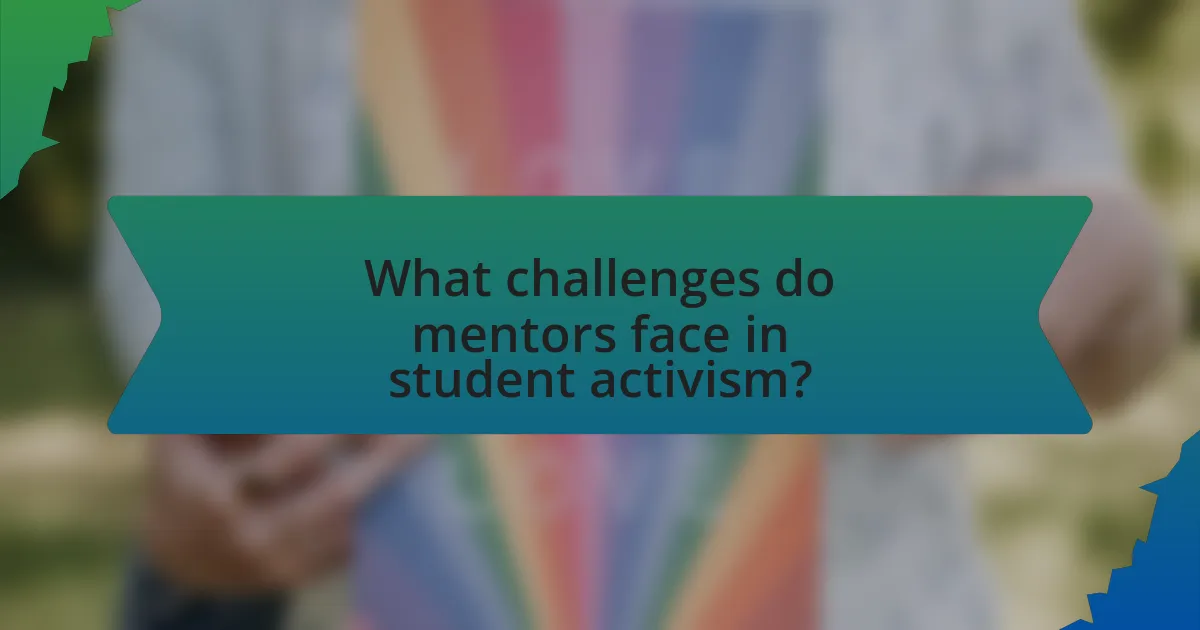
What challenges do mentors face in student activism?
Mentors in student activism face several challenges, including balancing their own commitments with the demands of mentoring, navigating institutional resistance, and addressing the diverse needs of students. These challenges arise as mentors often juggle professional responsibilities while providing guidance and support to student activists, which can lead to time constraints and burnout. Institutional resistance can manifest as pushback from administration or policies that hinder activism, complicating the mentor’s ability to effectively support students. Additionally, mentors must cater to a wide range of student backgrounds and perspectives, requiring them to be adaptable and sensitive to varying levels of experience and engagement in activism.
How can mentors overcome obstacles in guiding student activists?
Mentors can overcome obstacles in guiding student activists by fostering open communication and providing tailored support. Open communication allows mentors to understand the specific challenges faced by student activists, such as institutional resistance or personal conflicts. By actively listening and engaging in dialogue, mentors can identify these obstacles early and strategize effective solutions. Tailored support involves offering resources, networking opportunities, and emotional encouragement that align with the activists’ goals and contexts. Research indicates that mentorship significantly enhances the effectiveness of student activism, as seen in studies highlighting improved outcomes in campaigns led by mentored individuals compared to those without guidance.
What common misconceptions about mentorship in activism exist?
Common misconceptions about mentorship in activism include the belief that mentors must be experts in the field and that mentorship is a one-way relationship. Many assume that effective mentors need extensive experience or credentials, which can discourage potential mentors from participating. In reality, mentorship can thrive on shared experiences and mutual learning, where both mentor and mentee grow together. Additionally, the misconception that mentorship is solely about guidance overlooks the importance of collaboration and support, which are essential for fostering a dynamic activist community. Research indicates that mentorship relationships often benefit from reciprocity, where both parties contribute to the learning process, enhancing the overall effectiveness of activism efforts.
How can mentors address the diverse needs of student activists?
Mentors can address the diverse needs of student activists by providing tailored guidance, resources, and emotional support. This involves understanding the unique challenges each activist faces, such as navigating institutional barriers, developing leadership skills, and managing stress. For instance, research indicates that mentorship programs that focus on individualized support significantly enhance the effectiveness of student activism by fostering resilience and strategic thinking among participants. By actively listening and adapting their approach, mentors can help student activists build confidence and create impactful change within their communities.
What are best practices for effective mentorship in student activism?
Effective mentorship in student activism involves establishing clear communication, fostering a supportive environment, and encouraging critical thinking. Clear communication ensures that mentors and mentees understand each other’s goals and expectations, which is essential for productive collaboration. A supportive environment allows students to express their ideas and concerns without fear of judgment, promoting open dialogue and trust. Encouraging critical thinking helps students analyze issues deeply, develop their own perspectives, and engage in meaningful activism. Research indicates that mentorship programs that incorporate these practices lead to higher levels of student engagement and success in activism initiatives.
How can mentors establish trust and rapport with students?
Mentors can establish trust and rapport with students by demonstrating consistent support and active listening. When mentors show genuine interest in students’ concerns and aspirations, it fosters an environment where students feel valued and understood. Research indicates that effective mentorship relationships are built on open communication, where mentors provide constructive feedback and share personal experiences to create a sense of relatability. A study published in the Journal of Educational Psychology found that students who perceive their mentors as trustworthy are more likely to engage in open dialogue, leading to enhanced learning outcomes.
What resources are available for mentors to enhance their effectiveness?
Mentors can enhance their effectiveness through various resources, including training programs, mentorship frameworks, and online platforms. Training programs, such as those offered by the International Mentoring Association, provide structured guidance on effective mentoring practices. Mentorship frameworks, like the GROW model, help mentors set clear goals and facilitate productive conversations. Online platforms, such as MentorCity and Chronus, offer tools for matching mentors with mentees and tracking progress. These resources are validated by research indicating that structured mentorship leads to improved outcomes for both mentors and mentees, as highlighted in studies published in the Journal of Mentoring & Tutoring.
How can students maximize the benefits of mentorship in activism?
Students can maximize the benefits of mentorship in activism by actively engaging with their mentors, setting clear goals, and seeking feedback. Engaging with mentors fosters a deeper understanding of activism strategies and networks, while setting specific goals helps to focus efforts and measure progress. Seeking regular feedback allows students to refine their approaches and adapt to challenges effectively. Research indicates that mentorship can significantly enhance leadership skills and community engagement, as seen in studies like “The Impact of Mentoring on Student Leadership Development” published in the Journal of Leadership Education, which highlights the positive correlation between mentorship and student activism outcomes.
What steps should students take to find the right mentor?
Students should identify their goals and interests to find the right mentor. This involves reflecting on their academic and career aspirations, which helps in seeking mentors who align with those specific areas. Next, students should research potential mentors by exploring faculty profiles, professional networks, and alumni connections to find individuals with relevant experience and expertise. After identifying potential mentors, students should reach out with a clear and concise message expressing their interest in mentorship, highlighting their goals and how the mentor’s experience aligns with those goals. Finally, students should engage in an initial meeting to discuss expectations, communication styles, and mutual interests, ensuring a good fit for a productive mentoring relationship.
How can students actively engage with their mentors for better outcomes?
Students can actively engage with their mentors for better outcomes by establishing clear communication and setting specific goals. This proactive approach allows students to articulate their needs and expectations, fostering a productive mentor-mentee relationship. Research indicates that effective communication enhances the quality of mentorship, leading to improved academic performance and personal development. For instance, a study published in the Journal of Educational Psychology found that students who regularly interacted with their mentors reported higher satisfaction and achievement levels. By scheduling regular meetings, preparing questions in advance, and seeking feedback, students can maximize the benefits of mentorship.
